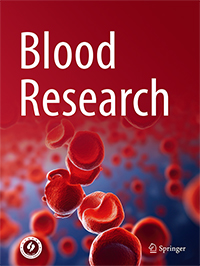Original Article
Korean J Hematol 2007; 42(2):
Published online June 30, 2007
https://doi.org/10.5045/kjh.2007.42.2.114
© The Korean Society of Hematology
Viruria in Adult Hemorrhagic Cystitis Patients Following Allogeneic Hematopoietic Stem Cell Transplantation and Implication of Antiviral Treatment
이종욱, 김성용, 이종욱, 이규만, 조병식, 엄기성, 김유진, 이석, 민창기, 김희제, 조석구, 김동욱, 민우성, 김춘추
가톨릭대학 의과대학 성모병원 가톨릭조혈모세포이식센터
한림대학 의과대학 연구소
Viruria in Adult Hemorrhagic Cystitis Patients Following Allogeneic Hematopoietic Stem Cell Transplantation and Implication of Antiviral Treatment
Background:
Viruria is frequently detected in patients who have had hemorrhagic cystitis (HC) following allogeneic hematopoietic stem cell transplantation (allo-HSCT). Urinary viruses, especially BK virus, have been suggested as a cause of HC following allo-HSCT, therefore antiviral therapy is emerging as a therapeutic approach for its treatment.
Methods:
Adult HC patients who underwent allo-HSCT from January 2005 to March 2006 at a single institution were enrolled. We performed a PCR-based assay for BK virus, JC virus, and CMV virus in urine obtained from the patients to determine the incidence of viruria, and the type of virus detected in the urine, and the effect of treatment with cidofovir on HC.
Results:
Of 155 patients that received allo-HSCT during the study period, 22 (14.2%) experienced HC. A viral study of urine obtained from 19 of these 22 patients revealed that 16 (84.2%) had viruria. Eleven patients had grade III-IV HC, 5 of which were treated with intravenous cidofovir. Three of the HC patients who underwent treatment responded to cidofovir, 1 had no response, and 1 had a complete response followed by recurrence.
Conclusion:
Most adult HC patients (84.2%) had viruria following allo-HSCT, however the response rate to antiviral therapy with intravenous cidofovir for the treatment of high grade HC (grade III-IV) was 80%. Therefore, antiviral therapy should be considered if high grade HC does not respond to hyperhydration and transfusional support.
Keywords Viruria, Cystitis, Hematopoietic stem cell transplantation, and Cidofovir
Article
Original Article
Korean J Hematol 2007; 42(2): 114-121
Published online June 30, 2007 https://doi.org/10.5045/kjh.2007.42.2.114
Copyright © The Korean Society of Hematology.
Viruria in Adult Hemorrhagic Cystitis Patients Following Allogeneic Hematopoietic Stem Cell Transplantation and Implication of Antiviral Treatment
이종욱, 김성용, 이종욱, 이규만, 조병식, 엄기성, 김유진, 이석, 민창기, 김희제, 조석구, 김동욱, 민우성, 김춘추
가톨릭대학 의과대학 성모병원 가톨릭조혈모세포이식센터
한림대학 의과대학 연구소
Viruria in Adult Hemorrhagic Cystitis Patients Following Allogeneic Hematopoietic Stem Cell Transplantation and Implication of Antiviral Treatment
Sung Yong Kim, Jong Wook Lee, Kyu Man Lee, Byung Sik Cho, Ki Seong Eom, Yoo Jin Kim, Seok Lee, Chang Ki Min, Hee Je Kim, Seok Goo Cho, Dong Wook Kim, Woo Sung Min, Chun Choo Kim
Catholic Hematopoietic Stem Cell Transplantation Center, St. Mary's Hospital, The Catholic University of Korea
Department of Laboratory Medicine, Hallym University College of Medicine, Seoul, Korea
Abstract
Background:
Viruria is frequently detected in patients who have had hemorrhagic cystitis (HC) following allogeneic hematopoietic stem cell transplantation (allo-HSCT). Urinary viruses, especially BK virus, have been suggested as a cause of HC following allo-HSCT, therefore antiviral therapy is emerging as a therapeutic approach for its treatment.
Methods:
Adult HC patients who underwent allo-HSCT from January 2005 to March 2006 at a single institution were enrolled. We performed a PCR-based assay for BK virus, JC virus, and CMV virus in urine obtained from the patients to determine the incidence of viruria, and the type of virus detected in the urine, and the effect of treatment with cidofovir on HC.
Results:
Of 155 patients that received allo-HSCT during the study period, 22 (14.2%) experienced HC. A viral study of urine obtained from 19 of these 22 patients revealed that 16 (84.2%) had viruria. Eleven patients had grade III-IV HC, 5 of which were treated with intravenous cidofovir. Three of the HC patients who underwent treatment responded to cidofovir, 1 had no response, and 1 had a complete response followed by recurrence.
Conclusion:
Most adult HC patients (84.2%) had viruria following allo-HSCT, however the response rate to antiviral therapy with intravenous cidofovir for the treatment of high grade HC (grade III-IV) was 80%. Therefore, antiviral therapy should be considered if high grade HC does not respond to hyperhydration and transfusional support.
Keywords: Viruria, Cystitis, Hematopoietic stem cell transplantation, and Cidofovir

Article Tools
Stats or Metrics
Related articles in BR
-
Transfusion support in hematopoietic stem cell transplantation
Dong Wook Jekarl, Jae Kwon Kim, Jay Ho Han, Howon Lee, Jaeeun Yoo, Jihyang Lim, Yonggoo Kim
Blood Res 2023; 58(S1): S1-S7 -
Prognostic impact of total body irradiation dose in pediatric acute lymphoblastic leukemia patients treated with allogeneic hematopoietic stem cell transplantation in second complete remission
Wonjin Jang, Suejung Jo, Jae Won Yoo, Seongkoo Kim, Jae Wook Lee, Pil-Sang Jang, Nack-Gyun Chung, Bin Cho
Blood Res 2022; 57(4): 256-263 -
Reduced-intensity conditioning versus myeloablative conditioning allogeneic stem cell transplantation for patients with myelofibrosis
Dong Hyun Kim, Jeongmin Seo, Dong-Yeop Shin, Youngil Koh, Junshik Hong, Inho Kim, Sung-Soo Yoon, Ja Min Byun
Blood Res 2022; 57(4): 264-271




 PDF
PDF Standard view
Standard view Export citation
Export citation Share
Share  Previous Article
Previous Article



